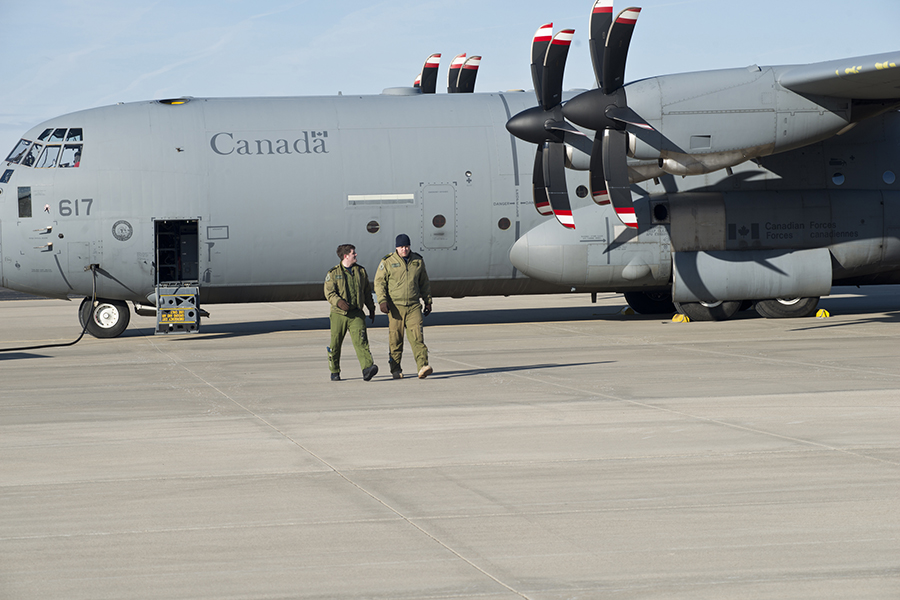"I find hope in the work of long-established groups such as the Arms Control Association...[and] I find hope in younger anti-nuclear activists and the movement around the world to formally ban the bomb."
U.S. Reverses Course on Open Skies Treaty
October 2018
By Kingston Reif
Days after refusing to certify a Russian aircraft for flights under the Open Skies Treaty, the Trump administration reversed course and agreed to approve the plane.
 Initially, the United States, without explanation, declined on Sept. 11 to sign a document confirming the treaty compliance of the Russian TU-214 aircraft, which carries an upgraded digital electro-optical camera that had been approved in 2016 for use on two other Russian aircraft for treaty flights.
Initially, the United States, without explanation, declined on Sept. 11 to sign a document confirming the treaty compliance of the Russian TU-214 aircraft, which carries an upgraded digital electro-optical camera that had been approved in 2016 for use on two other Russian aircraft for treaty flights.
The United States cast the only dissenting vote among the 23 countries that took part in the certification. Under the treaty, certification of new aircraft requires unanimous member-state consent.
“In breach of the Open Skies Treaty provisions, the head of the U.S. delegation refused to sign the final document, without giving any explanations or reasons, and citing direct instructions from Washington,” Sergei Ryzhkov, the chief of Russia’s Nuclear Risk Reduction Center, said on Sept. 12 according to the Tass news agency.
The treaty, which entered into force in 2002 and has 34 states-parties, aims to increase confidence in and transparency of military activities, particularly in Europe, by allowing unarmed aerial observation flights over the entire territory of its participants for information-gathering purposes. The parties have equal, yearly quotas of overflights and must make the information they acquire available to all treaty parties.
The treaty permits up to 42 overflights of Russia by states-parties, of which 16 can be flown by the United States.
Andrea Thompson, U.S. undersecretary of state for arms control and international security, told the Senate Foreign Relations Committee on Sept. 18 that the United States “had to consult with some additional technical experts” before providing the certification and that a decision would be made “within the next 24 hours.” She did not provide additional information about what the experts discussed or why those discussions had not taken place earlier.
On Sept. 19, the United States informed member states that it would certify the aircraft. The United States formally did so at the Sept. 24 meeting of the Open Skies Consultative Commission, the treaty’s implementing body.
A State Department official told Defense News on Sept. 20 that the decision to certify followed an extensive review and inspection process involving experts from the United States, allies, and partners. The official said that this process verified that the Russian aircraft and sensor meet all treaty requirements.
Meanwhile, no treaty flights have been conducted in 2018, and no flights are planned. A State Department official indicated an unspecified “impasse” is holding up flights.
“We are actively working with our allies and partners to strengthen the Open Skies Treaty and to resolve issues of mutual concern such as the impasse at the Open Skies Consultative Commission that continues to delay the commencement of treaty flights in 2018,” the official said.
At the Sept. 18 hearing, committee chairman Bob Corker (R-Tenn.) noted the problem. “We haven’t had a flight all year,” he said. “We can live without that data, but it hurts the 32 other countries that do not have the same alternative resources that we do.”
Washington for several years has raised numerous concerns about Russian compliance with the pact. The State Department’s annual compliance report released in April determined that Russia is violating the treaty by restricting observation flights over Kaliningrad, which is a sensitive Russian enclave between Poland and Lithuania, to no more than 500 km, and within a 10-kilometer corridor along Russia’s border with the Georgian border-conflict regions of South Ossetia and Abkhazia.
In response, the United States has placed restrictions on some of Russia’s treaty flights.
Thompson told the Senate Foreign Relations Committee that “recently Russia has resolved one violation of its obligations and has made overtures that suggest it could resolve another.” But she added that Russia had refused to address the violation related to Kaliningrad.
The Open Skies Treaty has also become a point of contention in Congress. (See ACT, July/August 2018.)
The final version of the fiscal year 2019 defense authorization act signed into law by President Donald Trump on Aug. 13 waters down language in the original House version that would have blocked the Air Force’s budget request to replace the aircraft that the United States uses to conduct Open Skies Treaty flights, including over Russia. Instead, the law conditions funding necessary to acquire an upgraded digital imaging system for treaty flights and implement certain decisions of the treaty’s implementing body.
The original version of this article misstated the nature of the U.S. concern regarding Russia's restriction of Open Skies Treaty flights over Kaliningrad.
